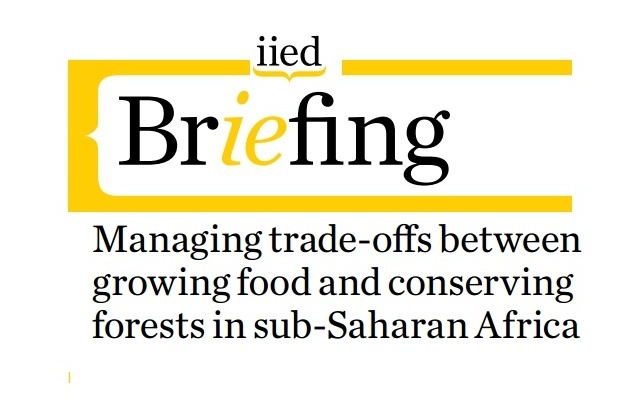Between growing food and conserving forests in sub-Saharan Africa


International Institute for Environment and Development (IIED) is conducting research to better understand existing and future competition and trade-offs between food production and natural forests, and the implications for land use policies in Sub-Saharan Africa (SSA).
___________________________________________________________________________________________________
Research by IIED's forest and biodiversity teams reveals that there is limited scope for meeting tripling domestic food demand in SSA by increasing food imports, reducing food waste and increasing crop yields. Agriculture will, therefore, continue to expand in SSA, and to an extent that exceeds the current forest conservation targets of many countries in SSA. The competition and trade-offs between the Sustainable Development Goals of ending hunger and conserving forests need to be recognized, better understood, and, where necessary, proactively negotiated. With the support of country partners, IIED aims to shed light on the opportunities and barriers to achieving more joined-up land use policy and planning for food and forests. This research is currently focused on Ethiopia, Tanzania and Ghana. Publications: Understanding agricultural drivers of deforestation through remote sensing: opportunities and limitations in sub-Saharan Africa, Samuel Bowers, Casey Ryan, Xiaoting Jones (2017) Working paper Managing trade-offs between growing food and conserving forests in sub-Saharan Africa, Phil Franks, Xiaoting Hou-Jones (2016) Briefing Food vs forests in sub-Saharan Africa: a challenge for the SDGs, Xiaoting Hou Jones, Phil Franks (2015), IIED Briefing paper. |
Governments in SSA face a dilemma: how to reconcile pledges to feed fast-growing populations with forest conservation?
Under Sustainable Development Goal 2 (end hunger, achieve food security etc.), African countries aim to fully meet domestic food demand by 2030 — projected to be 70 per cent higher than in 2010.
At the same time, under Sustainable Development Goal 15 (sustainable use of terrestrial ecosystems etc), countries aim to reduce and then halt deforestation, which, in SSA, is mainly driven by the need to grow more food.
Since imports, waste reduction and yield increases are rarely sufficient to meet future food demand, agriculture will continue to expand at the expense of forests.
Based on research in Ethiopia, Ghana and Tanzania, this briefing (Managing trade-offs between growing food and conserving forests in sub-Saharan Africa) provides pointers towards better managing the inevitable trade-offs, emphasising the importance of addressing governance and political economy issues alongside technical aspects.
___________________________________________________________________________________________________
Xiaoting Hou Jones ([email protected]), researcher, forest and biodiversity team, IIED's Natural Resources research group
Phil Franks ([email protected]), senior researcher, biodiversity team, IIED's Natural Resources research group
___________________________________________________________________________________________________
Sources:
___________________________________________________________________________________________________
Related content:
GODAN-NASA Competition: Bringing GeoInnovation for solving Zero Hunger!

